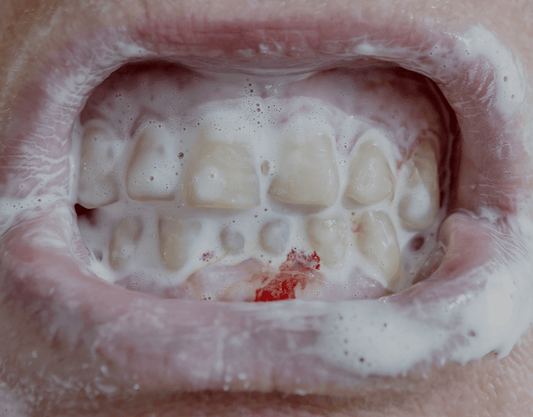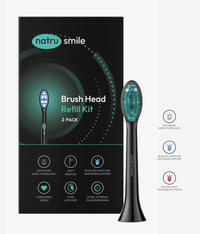
All products are certified by dental expert Dr. Greg Grillo
Having a cut on your gums can be an uncomfortable and often painful experience. The cut may have come out of the blue, from mouth trauma, or may have been caused by something like brushing too hard or flossing incorrectly. It might be a cut on gums by a tooth or a cut in gum near the wisdom tooth.
But regardless of the cause and location, you’ll want to take action and heal any existing cuts. In certain scenarios, you may want to visit a dental professional to get their advice.
We'll explore the causes, treatment, and prevention of cuts on gums, so you can have a better understanding of what’s going on in your mouth and how to prevent further damage.
What Causes Gum Cuts?
Gum cuts are typically caused by direct trauma to the gums. Maybe you accidentally bit yourself when you were chewing or used a toothbrush too aggressively when brushing.
Certain medical conditions like diabetes, HIV, or anemia can also weaken the gum tissue and make it more prone to cuts. Additionally, smokers may experience a greater risk of experiencing gum cuts due to their weakened capillaries.
Other potential causes can include:
- Eating sharp foods - Eating food with sharp edges or corners, such as chips, nuts, and hard candies.
- Poor oral hygiene - Poor oral hygiene and lack of regular dental visits can lead to gum disease, which increases the risk of getting cuts on the gums.
- Flossing too hard - Flossing incorrectly, too hard, or using the wrong floss
- Using a non-dental item that has aggravated the gums - Using a toothpick, fingernails, or other items to scratch at the gums.
- Gingivitis - This inflammatory condition of the gums caused by plaque buildup can lead to cuts.
- Braces - Wearing braces can irritate and abrade your gums.
- Sports injuries - Accidents such as falls or blows to the face can cause trauma to the mouth.
What Do I Do After I Get A Cut On Gums?
Right after you get a cut on your gums, the first thing to do is to stop the bleeding. You can do this by applying direct pressure with a clean gauze or cloth and gently biting down on it for 15 minutes.
Afterward, you may want to rinse your mouth with lukewarm salt water (one teaspoon of salt dissolved in 8 ounces of warm water). When you’re done rinsing, apply a thin layer of topical antiseptic ointment or gel to the cut. This will help reduce inflammation and encourage healing. You should also avoid eating hard, crunchy foods as they can further irritate the area.
How To Heal A Cut On Gums
If you notice a cut on your gums, it's important to take steps immediately to promote healing. Typically, your body will do a good job of healing itself, and the cut may go away within a few days.
Depending on the severity, though, you may want to intervene and take action to promote healing and reduce discomfort. Many things can be done at home, but we’ll also cover clinical treatments in this section.
Home Remedies
- Warm Saltwater - This remedy can be helpful in the first few days of healing and can help reduce inflammation and discomfort. To make a saltwater rinse, mix 8 ounces of warm water and 1 teaspoon of table salt. For about 30 seconds to 1 minute, swish the solution around your mouth before spitting it out.
- Ice - If you’ve just experienced trauma to your gums, like getting hit in the face or brushing too hard, applying ice to the area can help reduce swelling and pain. Put a few ice cubes in a plastic bag and wrap it with a soft cloth before pressing it gently to the outside of your mouth for 10 minutes at a time.
- Hydrogen Peroxide Rinse - A hydrogen peroxide rinse can be helpful if you’re dealing with an infection from the cut on your gums, as this solution is antibacterial. Mix 1 part of 3% hydrogen peroxide into 2 parts of water and swish around the mouth just like with the saltwater method.
- Mind What You Eat, Drink, and Chew - Avoid eating hard or acidic foods, drinking hot beverages, and chewing gum or other hard items that could aggravate the cut.
- Take Over-The-Counter Pain Medication - If the pain is too much to bear, take an over-the-counter anti-inflammatory medication such as ibuprofen.
Clinical Treatments
If home remedies don’t seem to be helping or if the cut on your gums is deeper, you may want to consider consulting with a dental professional. Depending on the severity of your condition, they may recommend a more aggressive treatment such as:
- Oral Antibiotics - If there is an infection present from the cut, antibiotics might be prescribed. Generally, these medications work to reduce inflammation, combat bacterial growth, and block the protein that tears down connective tissue.
- Surgery - If the gum cut is severe, a dental professional may suggest surgery to repair any damage and reduce the risk of infection.
- Stitches - If the gums are cut deeply, a dental professional may suggest stitches to help promote healing and reduce scarring. After the healing process, the stitches will be either removed by a doctor or dissolve on their own.
- Laser Therapy - This is another option for deeper cuts and can help minimize pain, bleeding, and inflammation while promoting the healing of the tissue. It’s not the cheapest option on the list, but if your cut is serious, it’s a good solution to sterilize your gums, form clots, and remove any diseased tissue.
Can Cuts On Gums Affect Overall Oral Health?
If a cut is severe enough, it can cause infection or even further damage to the tissue and bone. The gums are key to good oral health, and if they’re not taken care of properly, it can result in an array of problems, such as gum disease or even tooth loss. And not only will it affect your mouth, but it can also have an impact on the rest of your body.
These unexpected causes can play a role in the development of issues and conditions like cancer, reduction in respiratory function, and cognitive decline.
Prevention Of Cuts On Gums
Once a cut on your gums has healed, you may want to take steps to prevent future cuts from happening. This is especially true if the cut was caused by trauma or something you did yourself, such as brushing too hard. Or, if you’re worried that you’re prone to getting a cum on your gums, you might want to take preventative measures.
Here are some tips for preventing further damage:
- Use a soft-bristled toothbrush and brush gently in circular motions.
- Floss correctly with an up-and-down motion rather than side to side.
- Rinse with warm salt water after brushing and flossing.
- Visit your dentist for regular check-ups to ensure your gums are healthy.
- If you’re prone to mouth injuries from sports, you can purchase a custom-made or premade mouth guard.
- Take vitamins for teeth and gum health, including vitamin C and vitamin D.
Children And Gum Cuts
Kids are especially prone to cuts on the gums because they may not take proper care of their teeth and might be more likely to suffer from mouth trauma. As well, playing with pointed objects is a common cause of cuts on the gums.
To prevent this, parents should supervise tooth brushing until children can do it correctly on their own. They should also monitor their child’s dental health closely and make sure they visit a dentist regularly.
It’s not advised to use a hydrogen peroxide rinse for children, but they can do a warm saltwater rinse, avoid eating certain foods, and use ice to relieve gum pain. Children can also suck on an ice pop or ice cube to reduce swelling.
While these tactics are suitable for small and shallow cuts, a more serious cut should be treated by a dental professional. This includes cuts that don’t stop bleeding after applying direct pressure, deep or long cuts, infected cuts, and those that affect other aspects of oral health.
If you still have questions about cuts on gums and the best way to treat them, here are some FAQs for further information.
How Long Does A Gum Take To Heal?
A minor cut on the gum should heal in a few days. If you’re experiencing pain or discomfort, however, it could take up to two weeks for your gums to fully heal. In situations where other complications are present, such as infection or an underlying medical condition, the healing process could take much longer.
Why Won’t The Cut On My Gums Heal?
If the cut on your gums isn’t healing, it could be due to an infection or an underlying medical condition. While you’ll want to try intervening and treating the cut at home, you may want to consult your dentist or doctor for further advice.
For example, if you have diabetes, it’s likely that this may be having an effect on the healing process. High sugar levels can weaken your immune system and make it harder for cuts to heal. If this is the case, your doctor will help you manage and control your condition, which should help with healing any existing cuts or sores.
How Do You Know If A Cut In Your Gum Is Infected?
An infection can cause pain, swelling, and redness around the area. You might also have a bad taste in your mouth or pus coming from the cut. If you start noticing white spots on the gums over time, this can be a sign of infection and irritation to the tissues as well. In any case, if you’re concerned about an infection, it’s important to visit your dentist for further evaluation and treatment.
Can Burned Gums Cause Cuts On Gums?
It’s possible that burned gums can cause cuts on your gums. When the tissue of your gums is damaged by heat, it can lead to small cuts and abrasions. This kind of burn usually happens when you eat or drink something that is too hot, and it comes in contact with the soft tissues inside your mouth.










